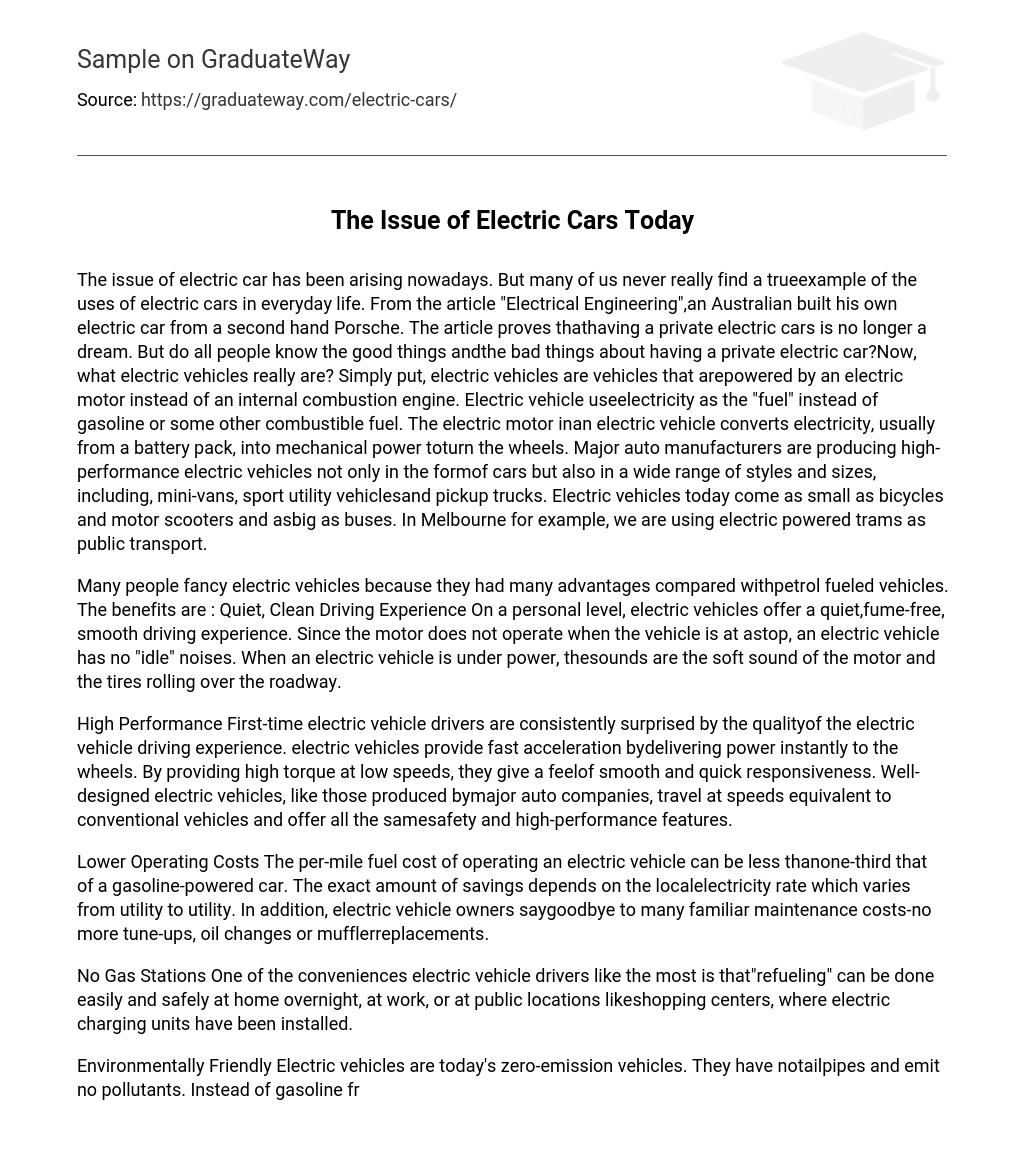The topic of electric cars is currently being discussed, but many people have yet to witness their practical use in everyday life. An article titled “Electrical Engineering” highlights an Australian individual who successfully created his own electric car using a second-hand Porsche, proving that owning a private electric car is no longer an unattainable dream. However, do individuals fully understand the advantages and disadvantages of owning one?
So, what exactly are electric vehicles? They are essentially vehicles that utilize an electric motor instead of an internal combustion engine. Instead of using gasoline or other combustible fuels, these vehicles rely on electricity as their “fuel”. The electric motor in these vehicles converts electricity from a battery pack into mechanical power to rotate the wheels. Major auto manufacturers not only produce high-performance electric cars but also manufacture various styles and sizes including mini-vans, SUVs, and pickup trucks. Electric vehicles can range from small bicycles or motor scooters to large buses. In cities like Melbourne, they even use electric-powered trams for public transportation.
There are several reasons why people tend to favor electric vehicles over petrol-fueled ones. One of the main advantages is the peaceful and eco-friendly driving experience they offer. Electric vehicles ensure a ride that is both free from emissions and smooth in nature. Furthermore, as the motor does not run when the vehicle is not moving, there are no idle noises to be heard. The only sounds emitted by an electric vehicle while on the move consist of a gentle hum from the motor and the contact between the tires and the road.
First-time drivers are often impressed by the superior driving experience of electric vehicles. These cars have the ability to provide quick acceleration by instantly powering the wheels, as well as a smooth and responsive feel thanks to their high torque at low speeds. Major auto companies have created electric vehicles that offer similar speed, safety, and high-performance features as traditional vehicles.
Electric vehicles have the potential to significantly reduce operating costs. Fuel expenses per mile can be up to 66% less compared to traditional gasoline-powered cars. The extent of these savings depends on the electricity rate, determined by the utility provider. Furthermore, owning an electric vehicle eliminates various maintenance costs including tune-ups, oil changes, and muffler replacements.
Electric vehicle drivers can conveniently and securely charge their vehicles at different locations. These locations include home overnight, work, or public places such as shopping centers that offer electric charging units.
Electric vehicles are eco-friendly and do not emit pollutants. They rely on electric power stations for fuel rather than having tailpipes like gasoline-powered cars. While power plants using fossil fuels produce emissions, electric vehicles generally have lower emissions compared to their gasoline counterparts. Additionally, power plants utilizing renewable energy sources generate no air pollution.
Electric vehicles contribute to the reduction of imported petroleum and address national security concerns associated with growing dependence on oil imports. Currently, Energy Security Australia and other developed countries import over 50% of their oil consumption, a percentage that continues to increase.
One of the current drawbacks of electric vehicles is their high cost to purchase and operate, in addition to their limited range on a single charge. Another concern that often arises is the difficulty of finding an electric socket or charging station during long trips. However, like conventional gasoline-powered cars, the driving range of an electric vehicle can vary depending on factors such as driving conditions (speed, stop-and-go, hilly terrain).
The driving range of an electric vehicle is influenced by various factors, including the use of auxiliary systems such as heat and air conditioning, as well as the type of batteries utilized. At present, first-generation electric vehicles generally have a range between 40 to 120 miles when fully charged. It is worth mentioning that this range is lower in comparison to traditional gasoline-powered cars. Nevertheless, it should be emphasized that most people typically travel less than 50 miles per day on average. Additionally, numerous electric vehicles used in company or government fleet operations are assigned routes that can easily be managed by today’s electric vehicles.
Advancements in new batteries, fuel cells, hybrid systems, and other technologies will improve the driving range of electric vehicles. The cost of charging an electric vehicle varies based on the time of day, utility rates, and vehicle type. However, it is certain that charging an electric vehicle is significantly cheaper compared to refueling a gasoline-powered car. On average, electric vehicle drivers are expected to spend less than $15 per month on fuel compared to $50 for gasoline. Similar to conventional cars, fuel efficiency is impacted by the weight of the vehicle and driving habits. Some utilities offer discounted rates for charging electric vehicles during off-peak hours typically from evening until noon. While gasoline prices can fluctuate greatly in a short period, electricity costs are more stable and projected to decrease in the future due to industry deregulation.
Overall, electric vehicles have numerous advantages over petrol-powered vehicles in various aspects. However, current technology and social factors hinder complete replacement of petrol cars by electric ones despite widespread desire among many individuals to own their own electric cars. Currently, we can expect further development through research and development (R&D) companies despite its current lack of efficiency.
Changing our current perception of vehicles is essential. The idea that electric cars will match the range and performance advantages of traditional petrol engines appears unlikely. However, before we can consider ourselves ready for electric vehicles, it is crucial to fully understand the challenges they bring.





